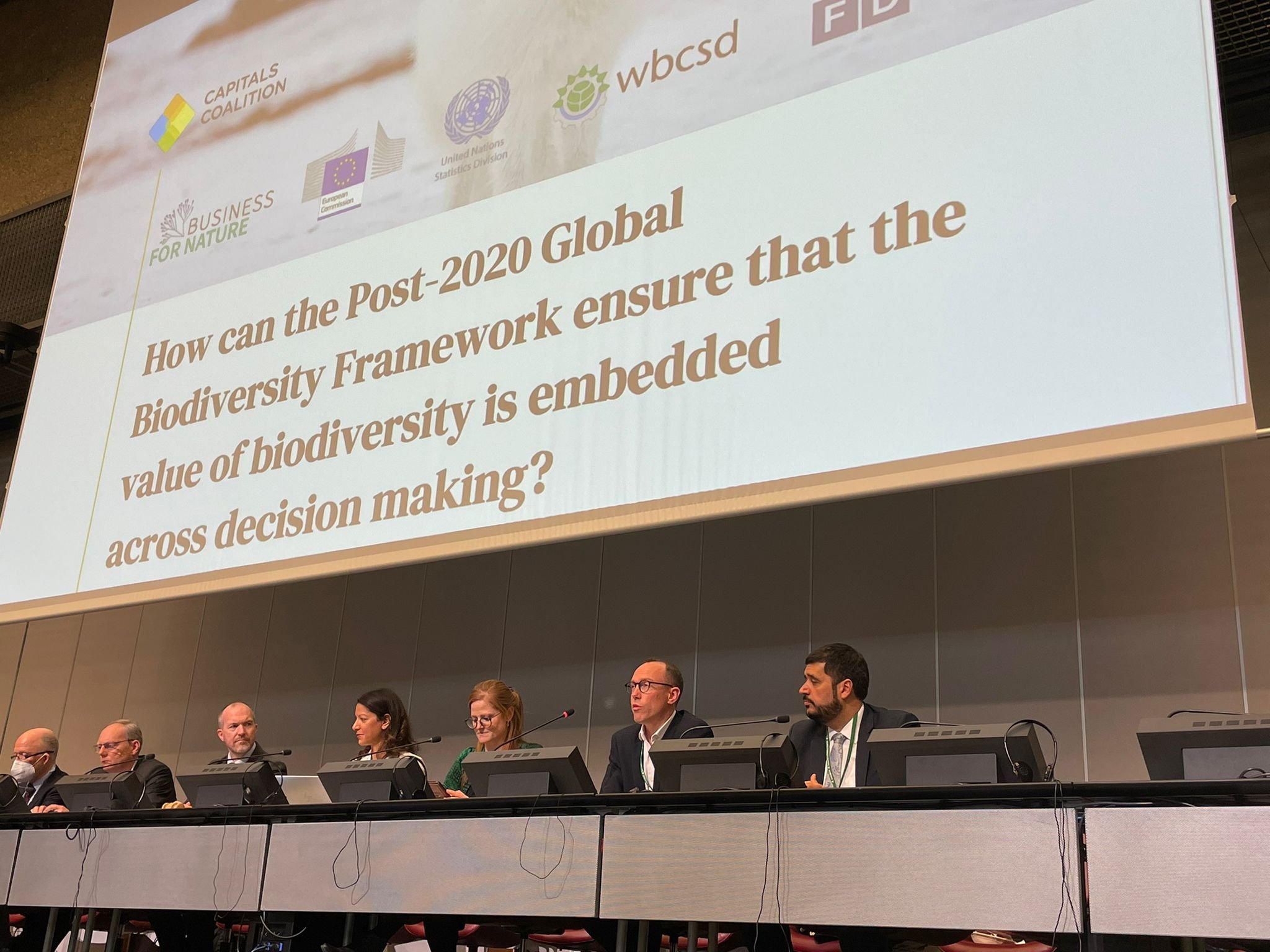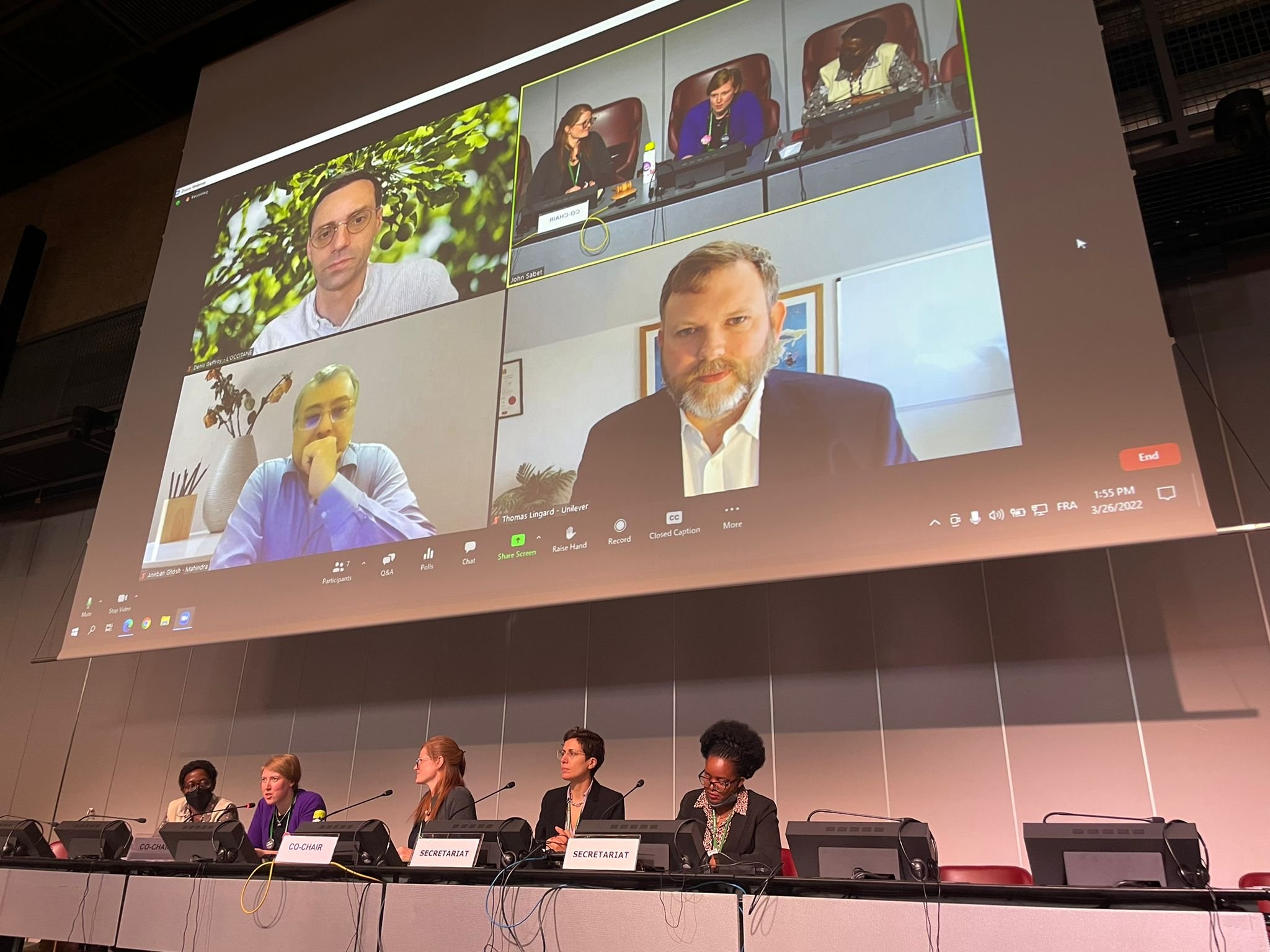Strong turnout from leading business but overall progress slow at UN CBD Geneva meetings
Panelists at a side event that Business for Nature co-organized on valuing biodiversity in decision-making.
Over the past few weeks, Business for Nature has been on the ground participating in the latest talks in preparation for the UN Biodiversity Conference COP15. Read our latest update on how the negotiations progressed.
Business for Nature was encouraged to see negotiations in preparation for COP15 resume on 14 March in Geneva after a two-year delay. The level of energy and enthusiasm to reach an agreement was palpable, with much-needed relationships and trust being established or refreshed in person after so long. But the progress made on the ground over the course of the 17 days was disappointing overall – there was lots of sharing, not much resolving.
Representatives from more than 40 organizations made up our business delegation on the ground during the first few days of the talks – this is the first time so many businesses have supported more ambition at a CBD meeting in person in this way before - with representatives from leading businesses including Unilever, Citi, Natura &Co, H&M Group, Holcim, GSK, Walmart, IKEA, Nestlé and L’Occitane.
So what are our overall takeaways from what has been an intense few weeks?
There is consensus on a mission to halt and reverse nature loss by 2030
Eva Zabey, Business for Nature’s Executive Director at the Non-state Actors’ Call to Action handover event.
We saw an encouraging, clear and strong consensus from governments on the need to adopt a clear and simple mission to “halt and reverse biodiversity loss by 2030”. It was recognized that this mission needs to be a rallying cry for society in general. This was supported by more than 300 organizations who called for governments to adopt this mission to secure a nature-positive world for the future of both people and the planet.
The concept of “Nature-positive” was also introduced as an option to complement the mission and was supported by many. A few wanted further discussion to clarify its definition and others proposed alternative wording like “net-positive” or “net-gain”. We also saw overwhelming support to keep the implementation date in 2030 rather than 2032.
“The need to halt and reverse biodiversity loss by 2030 must become clear in everybody’s mind. The faster that happens, the more action we will see. It’s not just great for the planet and people, but great for business too.”
While there was recognition on the role business must play to implement the Global Biodiversity Framework, limited progress was made on how far the target on business action should go
Panelists at Business for Nature’s side event, discussing how to harness the potential of business and finance for the Post-2020 Global Biodiversity Framework.
There seemed to be strong consensus among governments that businesses and financial institutions have a clear role to play to help implement the Global Biodiversity Framework.
Holcim, a global leader in innovative and sustainable building solutions that operates in more than 60 markets, gave a statement on behalf of Business for Nature in one of the main sessions calling for mandatory requirements for business to assess and disclose their impacts and dependencies on nature and for the target to incentivize business and financial institutions to reduce their impacts on nature across their operations and value chains.
Target 15 – concerning business action – was discussed but diverging views appeared on the role government has to play to encourage, incentivize or compel business to act. Some governments seem in favor of a target encouraging business action. Several, including the African Group, spoke in favor of taking legal, administrative and policy measures to drive business action. But overall, no agreement was reached, and Business for Nature will continue to push for three elements to be included:
Mandatory requirements for businesses to assess and disclose their impacts and dependencies on nature
Keeping a numerical target to reduce negative business impacts by 50%
Ensuring businesses address negative impacts across their operations and value chains
During the negotiations, The Taskforce on Nature-related Financial Disclosure (TNFD) launched the first beta version of its nature-related risk-management and disclosure framework. Alongside The Science Based Targets Network (SBTN), TNFD will also help with implementation of an ambitious target on the role of business. Read our brief summary explaining how.
The progressive voice of business was heard and appreciated
Parties welcomed the presence of Business for Nature’s delegation and the fact we were bringing progressive proposals from business into the discussions. Elizabeth Mrema, Executive Secretary of the UN Biodiversity commented: “We should give credit to the businesses already taking voluntary action. We need businesses to be an agent for change.”
Many businesses – such as Mahindra, Citi, Natura &Co, H&M Group, Holcim, Unilever and L’Occitane Group spoke at side events or made statements during the negotiations, and some joined constructive exchanges with countries directly.
Panelists at BfN’s side event discussing reforming environmentally harmful subsidies.
With our partners, we organized and contributed to eight events on a range of topics including on environmentally harmful subsidies. Subsidy experts Doug Koplow and Ronald Steenblik joined us for a lively debate following a recent study co-authored by The B Team that found we’re spending at least $1.8 trillion on subsidies that harm the environment. While the target on subsidies was discussed, there was little consensus on a way forward, which is disappointing. We also hosted an event on how to harness the business and finance sector’s potential to contribute to a successful Post-2020 Global Biodiversity Framework with speakers from business talking alongside the Global Youth Biodiversity Network the Convention on Biological Diversity and the Zimbabwe government.
“The Global Biodiversity Framework must ensure business models are being transformed by requiring mandatory biodiversity assessment and disclosure on the full value chain and reducing negative impact by 50%. Big companies should support the transformation of SMEs.”
What happens next?
Eva Zabey, Business for Nature’s Executive Director delivering our statement at the OEWG closing plenary.
Given the slow progress of the talks, the CBD today confirmed that an additional negotiation meeting will take place from 21-26 June in Nairobi ahead of the final round of COP15 negotiations that are likely to take place later this year in Kunming, China.
In the coming months, Business for Nature will continue to work with businesses to push for greater ambition. What we need now is strong political leadership on COP15 if we’re to get on the right track and deliver a strong outcome in China. The voice of business will continue to be crucial. In this final push we must keep up the active collaboration between business and governments to demonstrate the importance of putting ambitious policies in place to secure a meaningful agreement on nature.
“At these latest negotiations, leading businesses showed up in force calling for more ambition to secure a global agreement on nature that works for people and nature.
So far, the negotiations do not reflect the sense of urgency that science demands. We need political leadership to find solutions and deliver an enabling environment that will transform the regulatory and financial systems to recognize our shared accountability and responsibility to achieve a nature-positive world by 2030.”





